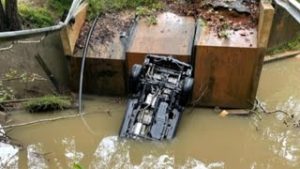As an accident and injury lawyer in Georgia and an active mediator, I am well aware of the struggle to balance a vigorous representation of the client with a dose of cold reality. I was gripped by the headlines a week ago about the tragic death of the Father in North Carolina who drove into the gulch of a washed out bridge and passed away. North Carolina is unfortunately a jur isdiction that, unlike Georgia, follows the doctrine of pure comparative negligence. That means that if the man who passed away is 1% responsible for his own death, he cannot recover.
isdiction that, unlike Georgia, follows the doctrine of pure comparative negligence. That means that if the man who passed away is 1% responsible for his own death, he cannot recover.
Let’s review the facts. The bridge in question has been washed out for 9 years, since 2013. The decedent lived 4 miles away and had driven to the birthday party for their children at a house adjacent to the creek. What is not stated in the lawsuit is how Google Maps got him to the location. One would image that to arrive there, maps had taken him a different way. It is assumed that Google will have records showing that it gave the decedent different directions on the return leg, taking him home over the washed out bridge.
Now we know the facts and the issue is how does the law hinder the family making a recovery under the law?
The Law of Relying on Google Maps
Taking the facts and applying it to the law, there are two primary obstacles; 1) Google will argue that it is negligent to driving blindly down an unlit street on a rainy night and, 2) that he signed the disclaimer of liability when he acknowledged the EULA agreement that everyone who downloads Google Maps agrees to wherein they warn you not to blindly rely on Google Maps. Here is the legal language:
“Actual Conditions; Assumption of Risk. When you use Google Maps/Google Earth’s map data, traffic, directions, and other content, you may find that actual conditions differ from the map results and content, so exercise your independent judgment and use Google Maps/Google Earth at your own risk. You’re responsible at all times for your conduct and its consequences.”
After confirming that the facts on the directions are as plead in the lawsuit, Google will send a series of documents showing that the decedent agreed to these terms when he agreed to use Google Maps. Their argument will be that he agreed not to blindly rely on the maps. Under North Carolina law, if they can show the judge that as a matter of law, a person who is warned not to blindly rely on a mapping program is at least 1% to blame, Google can be 99% responsible, but the lawsuit is still dismissed. Georgia follows the modified comparative negligence rule which says that you as the person filing the suit can be somewhat responsible so long as you are not more than 50% responsible, and still win the case. Applying Georgia law to these facts, the case would get past summary judgment and the family could still have their day in Court. If he were found say 10% responsible, then whatever the damages were, say $10,000,000; the award would be reduced by 10% to $9,000.000. If the jury were to say it’s 50/50%, then the family would get nothing.
In short Georgia Law is much more favorable to giving the Paxson Family a chance to have their day in Court. It will be an interesting case to watch unfold.
 Atlanta Injury Attorney Blog
Atlanta Injury Attorney Blog

